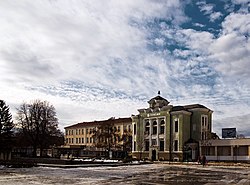|
Targovishte
Targovishte (Bulgarian: Търговище, also transliterated Tǎrgovište, pronounced [tɐrˈɡɔviʃtɛ], Turkish: Eski Cuma) is a city in Bulgaria, the administrative and economic capital of Targovishte Province. It is situated at the northern foot of the low mountain of Preslav on both banks of the Vrana River. The town is 335 kilometres (208 miles) north-east of the capital Sofia and about 125 km (78 mi) west of the city of Varna and the Bulgarian Black Sea Coast. Targovishte is known as an old market settlement. NameThe name comes from the Slavic root targ ("trade") + the Slavic placename suffix -ishte, "market town" (a calque of the Ottoman Turkish Eski Cuma, "old Friday", though the Turkish name may be derived from the earlier Bulgarian Sborishte "gathering place"). The name is etymologically and semantically the same as that of the city Târgoviște in Romania and Trgovište in Serbia. CityArchaeological studies prove that in these places there were people in the Copper-Stone Age (Chalcolithic) – between the 5th and the 4th millennium BC. In the city's vicinity are the remains of Thracian settlements (5th–3rd century BC), a Roman settlement (2nd–4th century AD), and a fortress from the early Byzantine period (5th–6th century). A Bulgarian settlement was founded in the 10th century during the First Bulgarian Empire, however due to its proximity to the capital Preslav, it did not develop until the 12th century. In the 12th century, due to its location on a main road from the new capital Veliko Turnovo, a fortress by the name "Сборище" (Sborishte) was built. In the 18th and 19th centuries it became a famous market for animals and craft products called Eski Cuma ("old bazaar" in Turkish).[2][3][4][5][6] A monastical school was opened in the 18th century and a secular one, called the Slaveykov School and situated in the old Varosha Quarter was established in 1846, with Petko Slaveykov being a teacher there; a chitalishte was also built. Industrial development began after the Second World War. Factories producing car batteries and machines for the food industry were opened; later, furniture and textile industries developed. One of Bulgaria's largest wine production factories is located there. Targovishte is home to one of the largest glass factories in Europe. The investment in the factory was $380,000,000 and employs 1,500 people.[7] The town is a cultural centre. In 2000, ruins of an Ancient Roman town called Missionis (Мисионис) were unearthed near Targovishte. The town art gallery named after the eminent Bulgarian artist Nikola Marinov, who was born here, has a considerable collection of his works. The local football team is called PFC Svetkavitsa ("lightning") and plays in the B PFG. The city is also noted for its shooting sports traditions. There is also a drama theatre and a puppet theatre.  PopulationIn January 2012, Targovishte was inhabited by 37,341 people within the city limits, while the Targovishte Municipality with the legally affiliated adjacent villages had 56,868 inhabitants.[8] The number of the residents of the city (not the municipality) reached its peak in the period 1980-1990 when exceeded 45,000 with a highest rate in 1989 numbering 47,798.[9] The following table presents the change of the population after 1887.
Ethnic, linguistic and religious compositionAccording to the latest 2011 census data, the individuals declared their ethnic identity were distributed as follows:[14][15]
Total: 37,611 The ethnic composition of Targovishte Municipality is 33,229 Bulgarians, 14,883 Turks and 3,902 Roma among others. MunicipalityTargovishte is the administrative centre for the Targovishte Municipality, one of five municipalities of the Targovishte Province. In addition to Targovishte, which has the status of town (in Bulgarian: град, transliterated as grad), the municipality contains 51 other localities with the status of village (in Bulgarian: село, transliterated as selo). The following list shows the names of localities transliterated in Latin alphabet,[16][17] followed in parentheses by the name in the Bulgarian Cyrillic alphabet (which links to the corresponding Bulgarian Wikipedia article). HonourTargovishte Glacier on Greenwich Island in the South Shetland Islands, Antarctica is named after Targovishte. Churches
Schools
Sport
Notable people
International relationsTwin towns – sister citiesTargovishte is twinned with:[21]
Gallery
References
External linksWikimedia Commons has media related to Targovishte. Wikivoyage has a travel guide for Targovishte. |
||||||||||||||||||||||||||||||||||||||||||||||||||||||||||||||||||||||||||||||||||||||||||||||||||||||||||||||||||||||||||||















